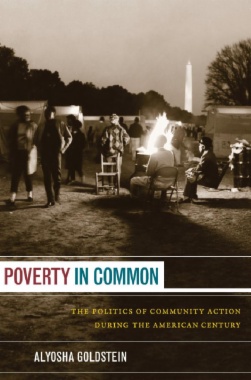After the Second World War, the idea that local community action was indispensable for the alleviation of poverty was broadly embraced by US policymakers, social scientists, international development specialists, and grassroots activists. Governmental efforts to mobilize community action in the name of democracy served as a volatile condition of possibility for poor people and dispossessed groups negotiating the tension between calls for self-help and demands for self-determination in the era of the Cold War and global decolonization. In Poverty in Common, Alyosha Goldstein suggests new ways to think about the relationship among liberalism, government, and inequality in the United States. He does so by analyzing historical dynamics including Progressive-era reform as a precursor to community development during the Cold War, the ways that the language of "underdevelopment" articulated ideas about poverty and foreignness, the use of poverty as a crucible of interest group politics, and radical groups' critical reframing of community action in anticolonial terms. During the mid-twentieth century, approaches to poverty in the United States were linked to the racialized and gendered negotiation of boundaries—between the foreign and the domestic, empire and nation, violence and order, and dependency and autonomy.
- Contents
- Acknowledgments
- Introduction: ‘‘Now, We’re Our Own Government’’
- Chapter One: Freedom Between: Inequality and the Democracy of ‘‘Felt Needs’’
- Chapter Two: On The Internal Border: Colonial Difference and the Locations of Underdevelopment
- Chapter Three: The Civics and Civilities of Proverty: Participation, Policing, and the Poor People’s Campaign
- Chapter Four: The Surplus of Inclusion: Poverty, Pluralism, and the Politics of Community
- Chapter Five: Thresholds of Opposition: Liberty, Liberation, and the Horizon of Incrimination
- Conclusion: A Peculiar Freedom: Community and Poverty, from New Federalism to Neoliberalism
- Notes
- Bibliography
- Index

